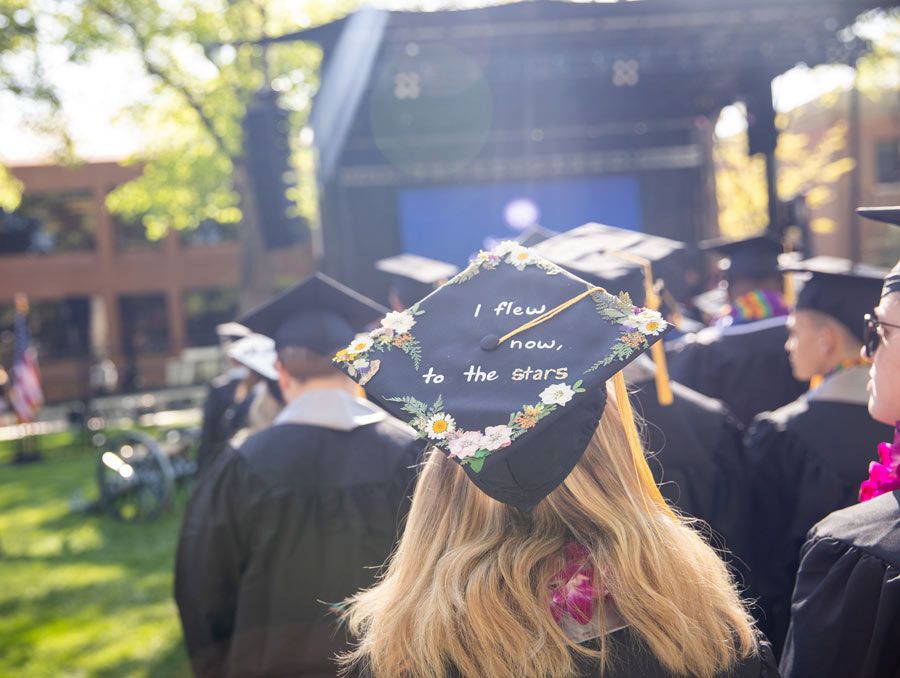Dean Katherine McCall spoke to the College of Science community on Dec. 14 to review progress made in the college over the past year.
“So, what is the state of the College?” Dean McCall asked in her opening remarks. “Strong.”
College numbers
Winter graduation is no longer a small, intimate affair. The stands in Lawlor were full for two ceremonies in December and the College of Science alone graduated 180 undergraduates and 28 graduate students.
Many of our programs are implementing new and innovative outreach and recruitment intitatives to prospective students and their families to meet enrollment goals. Following nationwide trends enrollment in the College was down slightly in Fall 2022 from the prior year. However, the number of student credit hours taught in the College in Fall 2022 increased by 3% and was 27% of the student registration generated by the University. With an expected increase in enrollment this coming year, the College’s contribution to education at the University will continue to grow.
Research productivity remains high in the College. The four-year average showed 100 grants per year, bringing in $33 million per year.
The number of employees in the College is up by 20 this December compared to last December, totaling 1,013 and the College has been given permission to start over a dozen searches to fill faculty vacancies in the spring.
Search for a new dean
The University has undertaken a search for a new dean of the College of Science to drive the high-impact research and teaching activities of faculty and students in the College. The position was posted on December 8 and the soft close is February 8, 2023. McCall has been serving in the interim position since December of 2020 when former dean Jeffrey Thompson was promoted to Executive Vice President and Provost of the University. The search is facilitated by Parker Executive Search. For more information, please visit the search firm’s website. Recommendations and nominations for potential candidates are encouraged.
Implementing the University’s Strategic Plan
A major University initiative is implementation of the Strategic Plan, running from 2023-2027. The College of Science will play an important role in fulfilling all six primary goals of the University’s Strategic Plan. The University plans to:
- “Strengthen the Pack” by increasing enrollment to 25,000 students by 2030 and to hire faculty and staff commensurate with the needs of that student body. As the College of Science provides over a quarter of all student instruction, we will be large players in student, faculty and staff growth.
- “Invest in Our Future” by delivering services, organization and infrastructure, both physical and technological, to our University. Investment in College of Science research and infrastructure has always provided a significant return on investment. We look forward to helping shape the direction of investment in the future.
- “Lead for Nevada” ensuring that the University serves its land-grant mission. The workforce coming out of the College of Science is diverse and critical for our region, from scientists and science educators to psychological service providers and mining engineers.
- “Transform the World” by elevating its research status within R1 universities. The College of Science is a major contributor to the overall research enterprise and continues to grow its research portfolio. “It is humbling to see the extraordinary work going on in the College every day,” McCall said.
- “Make Silver and Blue the New Green” by implementing sustainable practices on our campus and leading in environmental expertise. Through research, instruction, and implementation, every unit in the College contributes to this goal. We have an impact on mineral recycling, geothermal energy exploration, the practice of climate-conscious behavior and more.
- “Expand the Wolf Pack Impact” by strengthening the University’s reputation and brand. The College of Science provides a large share of the positive media content shared with the world, and recognition of our outstanding research and instruction continues to grow.
Additions to the College community
A tradition at the December State of the College gathering is the introduction of employees new to the College or their position since the previous December. There were 62 employees to introduce from nine units and the College office. These include 24 classified staff, 17 administrative faculty, 11 postdoctoral scholars and 10 academic faculty. All were enthusiastically welcomed to the College community.
Gratitude for faculty and staff support
Every day, faculty and staff have positive impacts on individual students, drive ground-breaking research to change the world and respond to requests to support the College and University. Additionally, faculty and staff join alumni and friends as generous donors to the College and University. Contributions in 2022 to support professorships, scholarships, research equipment and student need exceeded $3.9 million, resulting from over 630 individual donors.
December 2022 marked the end of the second annual Department Generosity Challenge – a challenge to have the highest percentage giving from unit faculty and staff to any program at the University. This year, McCall suggested donations to the College of Science student emergency fund or to the inception of a diversity fund for the College. Between November 18 and December 31, donors to the emergency fund helped meet dire end-of-year need for multiple students; donors to the diversity fund made possible an endowment to support College diversity initiatives in-perpetuity. Winners of the Department Generosity Challenge are Geography for the highest percentage participation, and Mining and Metallurgical Engineering for the highest percentage growth in participation.
The State of the College is strong because of its outstanding constituency – excellent students, innovative faculty, dedicated staff, generous friends.
"As the search for new College leadership moves along, as our campus community continues to grow and as you continue to support our students, I know the State of the College will remain strong," McCall said. "Thank you for your hard work through the past year, and Go Pack!"
















